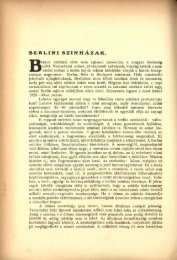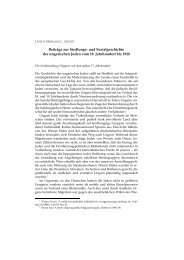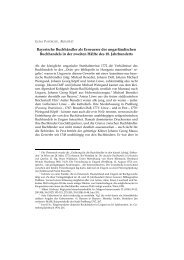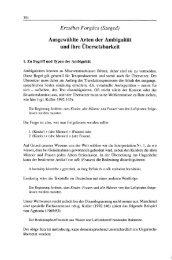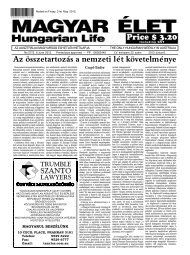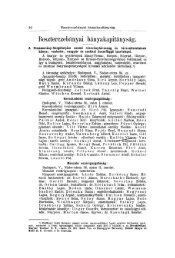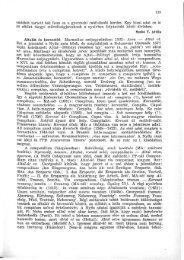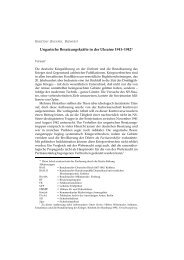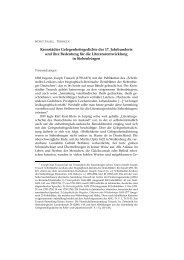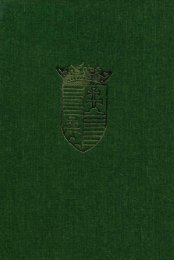Journal of Eurasian Studies - EPA
Journal of Eurasian Studies - EPA
Journal of Eurasian Studies - EPA
Create successful ePaper yourself
Turn your PDF publications into a flip-book with our unique Google optimized e-Paper software.
April‐June 2010 JOURNAL OF EURASIAN STUDIES Volume II., Issue 2.<br />
_____________________________________________________________________________________<br />
These reasons resulted in the second revolt in the past five years and the present situation in the<br />
republic is very complex and deeply contradictory. In this context the following scenarios may take place:<br />
I. A civil war is still possible, across a North ‐ South dividing line. This is the most negative tendency,<br />
because in this case we the country will lose its integrity and statehood. If this will materialise it will mean<br />
that the Provisional Government failed to control the situation and the unity <strong>of</strong> the Kyrgyz State will be<br />
endangered.<br />
II. The Kyrgyz Republic will use the the chance for a third revival after gaining sovereignty and will<br />
start a positive process <strong>of</strong> development. However, much depends on political leaders, their level <strong>of</strong><br />
understanding the situation and their wisdom to choose the right development strategy. This scenario<br />
would be most supportive for the realization <strong>of</strong> hope <strong>of</strong> millions <strong>of</strong> people.<br />
III. The possibility <strong>of</strong> new conflict among the opposition (now in power) could lead to a new stage <strong>of</strong><br />
destruction. This scenario is real because the leaders <strong>of</strong> the Provisional Government are very different.<br />
Their intellectual level, strategic orientation and personal interests are very different from each other.<br />
Some <strong>of</strong> the leaders <strong>of</strong> the Provisional Government have no real patriotic qualities; some are only<br />
motivated by their personal interests.<br />
In order to understand the reasons <strong>of</strong> the April’s revolt in the Kyrgyz Republic we need to consider the<br />
transformation process <strong>of</strong> Kyrgyzstan. The Kyrgyz Republic, after the proclamation if independence in<br />
1991, has witnessed a transformation process from a traditional, socialistic society to a democratic state,<br />
but most people in the country have not got experience in developing a democracy. In this context the<br />
notion <strong>of</strong> “transition” evinces methodological significance in researching the economic, politic and social‐<br />
cultural situation. It should be noted that the transition period in Kyrgyzstan is lasting for a fairly long<br />
time – two decades and it has not been yet completed.<br />
The main important topic in this relation is the Constitution. After the declaration <strong>of</strong> independence an<br />
orientation towards democratic reforms began and the new constitution development project was started.<br />
The constitution appeared in 1993, but it underwent modifications for four times. In 1996 a modification<br />
was introduced to divide the parliament into two parts: Legislative Assembly and Assembly <strong>of</strong> Peoples’<br />
Representatives. In 1998 an article on private property on means <strong>of</strong> production and an article on abolition<br />
<strong>of</strong> prohibition <strong>of</strong> freedom <strong>of</strong> press was introduced. In 2003 a new redaction <strong>of</strong> the constitution was<br />
adopted. It synthesized all the modifications and introduced corrective measures on many points, both <strong>of</strong><br />
economic and social‐political character. But after the revolution in March 2005 the constitution was<br />
changed for the fifth time. New redaction was due in 2006, but since 2007 new talks were started about<br />
the necessity to change the document. In June 2010 the sixth Constitution will be passed. Permanent<br />
changes <strong>of</strong> the Constitution is the first reason <strong>of</strong> a stable crisis, because it reflects the attitude to the very<br />
highest law. The new historical tradition <strong>of</strong> the Kyrgyz Republic’s sovereignty comes from the first<br />
President – Askar Akaev who is mainly responsible for the formation <strong>of</strong> the present tradition <strong>of</strong> the<br />
political and social life <strong>of</strong> the Kyrgyz people.<br />
_____________________________________________________________________________________<br />
© Copyright Mikes International 2001‐2010 122


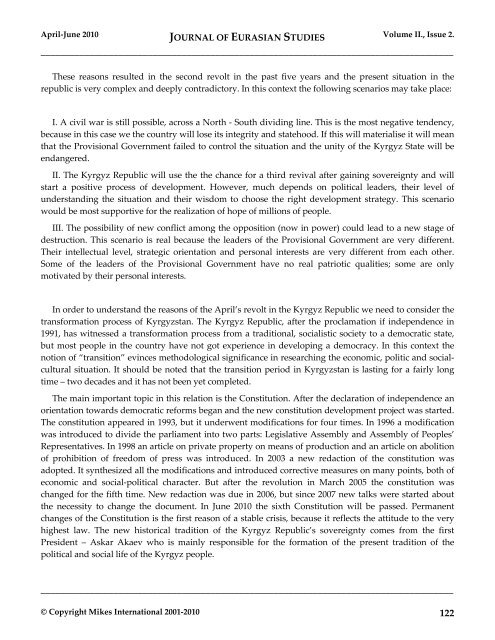
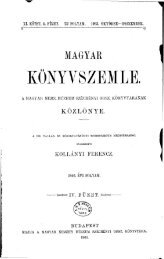
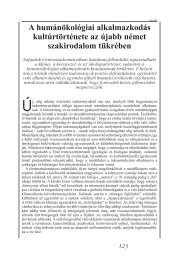
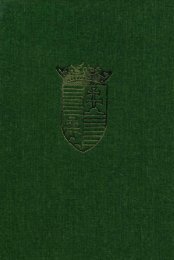
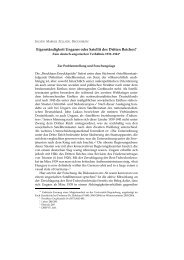
![Letöltés egy fájlban [36.8 MB - PDF] - EPA](https://img.yumpu.com/23369116/1/172x260/letoltes-egy-fajlban-368-mb-pdf-epa.jpg?quality=85)
